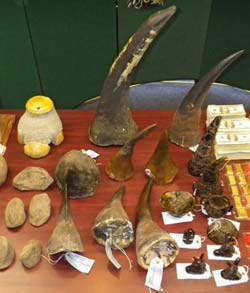 $800,000 of illegally acquired "profits" made by two convivcted rhino horn traffickers in the US will be used to protect rhinos in Africa Los Angeles, USA, May 2013—The sentencing on May 15 of two California businessmen in Los Angeles for trafficking in rhino horn will send both to prison and ensure that $800,000 of their illegally acquired "profits" end up helping protect rhinos in Africa. Saying she wanted to send a message against the “extremely serious” crime of trafficking in rhinoceros horns, federal judge Christina Snyder remarked that she had traveled to Africa and personally witnessed the effects of poaching.
$800,000 of illegally acquired "profits" made by two convivcted rhino horn traffickers in the US will be used to protect rhinos in Africa Los Angeles, USA, May 2013—The sentencing on May 15 of two California businessmen in Los Angeles for trafficking in rhino horn will send both to prison and ensure that $800,000 of their illegally acquired "profits" end up helping protect rhinos in Africa. Saying she wanted to send a message against the “extremely serious” crime of trafficking in rhinoceros horns, federal judge Christina Snyder remarked that she had traveled to Africa and personally witnessed the effects of poaching.
Vinh Chung "Jimmy" Kha and Felix Kha, who pleaded guilty in September 2012 to U.S. federal charges brought as a result of Operation “Crash” (an ongoing U.S. Fish and Wildlife Service investigation of rhino horn trafficking), were ordered to spend 42 and 46 months in prison, respectively; pay $20,000 in criminal fines (plus $100,000 from Jimmy Kha's company) and $185,000 in tax fraud penalties and assessments; and forfeit seized rhino horns and other assets to the Government. These assets include $800,000 in cash, gold, jewelry and precious stones that will be turned over to the Multinational Species Conservation Fund to support on-the-ground rhino conservation efforts in Africa.
"Rhinos in Africa are being poached to the brink of extinction because of the demand for rhino horn," said Service Director Dan Ashe. "It's only fitting that the ill-gotten gains of rhino horn traffickers be used to protect those animals that remain in the wild."
"The special agents and federal prosecutors supporting Operation Crash worked hard not only to bring these defendants to justice, but also to make sure the international effort to conserve rhinos received this extra financial boost," Ashe said. "The money from this investigation more than doubles the amount typically distributed from the Multinational Species Fund in grants each year to support efforts by African nations to protect rhinos."
The Khas, whose Federal rap sheets now include conspiracy, smuggling, money laundering and tax evasion, as well as felony Lacey Act violations, are among 14 defendants across the country arrested to date in Operation Crash, which has exposed large-scale trafficking in rhino horn in the United States to feed markets in Vietnam and other Asian countries.
The Multinational Species Conservation Fund was created by the U.S. Congress to provide grant money to support conservation of rhinos, tigers and other highly endangered species in the wild. Specifically, grants for rhino conservation in Africa have been used over the years to strengthen protections for rhinos, conduct surveys of populations and habitat, develop management capacity, carry out environmental education and awareness campaigns, involve local communities in conservation activities, and develop alternative livelihoods to discourage poaching as an "economic" activity. The Fund now provides about $700,000 each year for rhino conservation efforts in Kenya, Tanzania, Zambia, Zimbabwe, Namibia, and South Africa, much of them targeting anti-poaching efforts.